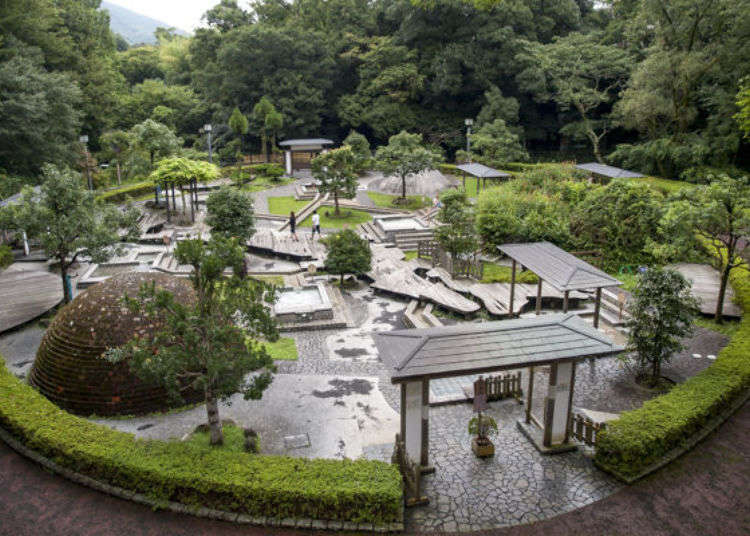
Experiencing a real Japanese hot spring is on the “things I absolutely have to do” list of pretty much everyone who comes to Japan. While Hakone and Atami are famous hot spring resort towns not far from Tokyo, we’re going to take you to Yugawara instead. It is one of the oldest hot springs in the Kanto area, known far and wide for its positive effects on wounds and injuries. Yugawara also boasts its very own foot bath theme park called Doppo no Yu that will pamper both feet and soul with nine unique types of foot bath. Located in the scenic Manyo Park, relax, unwind, and enjoy pure foot bath bliss, Japanese-style!
Plenty of Sights to See: Manyo Park is Lush with Nature
Manyo Park is about an 8-minute car ride away from JR Yugawara Station. Inside the park and nestled on the banks of Fujikigawa River lies Doppo no Yu, the foot bath paradise. A stone monument with a poem from the Man'yōshū (Japan’s oldest collection of poetry) mentioning Yugawara’s hot springs greets you at the entrance of the park, a testimony of just how long these hot springs have been enjoyed by the people of Japan.
A natural waterfall awaits right after, the first beautiful sign of just how lush and wild Manyo Park is.
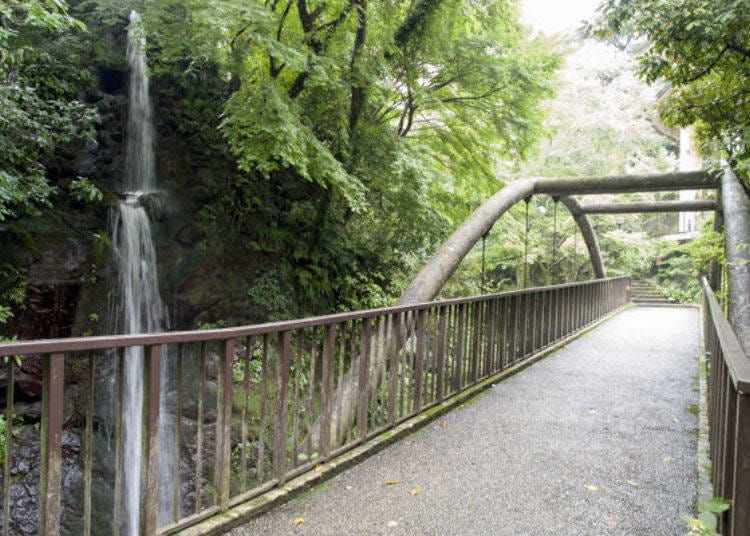
It is about 4 to 5 meters high, elegantly flowing down the dark stones, through the branches of the trees. Enjoy the cool freshness of the air as you walk past, and you’ll feel excited for what natural sights await ahead.
The path to Doppo no Yu’s foot baths is lined with the lush nature that Yugawara is famous for, with little freshwater crabs coming out to greet you and butterflies occasionally crossing your way. The murmuring of the river, the chirping of the birds, and the soft rustling of the leaves already make you feel more relaxed. This place seems so far away from the hustle and bustle of the city.
Following the mossy path will lead you to a water basin to wash your hands. Everyone comes to Manyo Park and Doppo no Yu is surprised that the water is warm – real, natural hot spring water, even inside a water basin. Little discoveries like these are what makes Yugawara so famous.
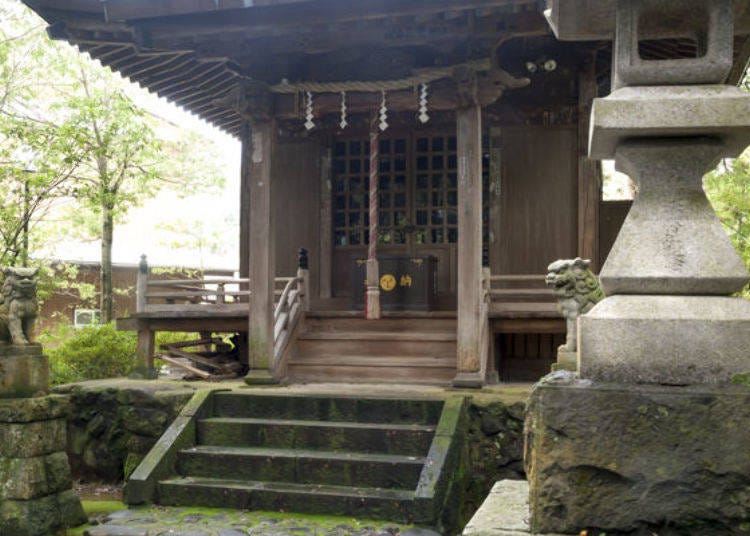
A bit further is a shrine that seems to be as old as the hot springs themselves. It’s called Kumano Shrine and the deity enshrined within is said to have been brought here from Kii province, today’s Wakayama Prefecture. Apparently, it is the guardian of bathing and health called Yu no Gongen. Without a doubt, it seems like the perfect place for such a guardian.
After a relaxed walk of about 10 minutes, you’ll arrive at Doppo no Yu, today’s main highlight.
9 Types of Foot Bath: Finding Your Favorite
Yugawara has been loved among many great minds of literature, such as Doppo Kunikida, Natsume Soseki, Akiko Yosano, and many others. Doppo Kunikida, in particular, has expressed his deep adoration for the area by writing a book titled Yugawara yuki “Towards Yugawara.” The foot bath theme park Doppo no Yu is named after him respectively.
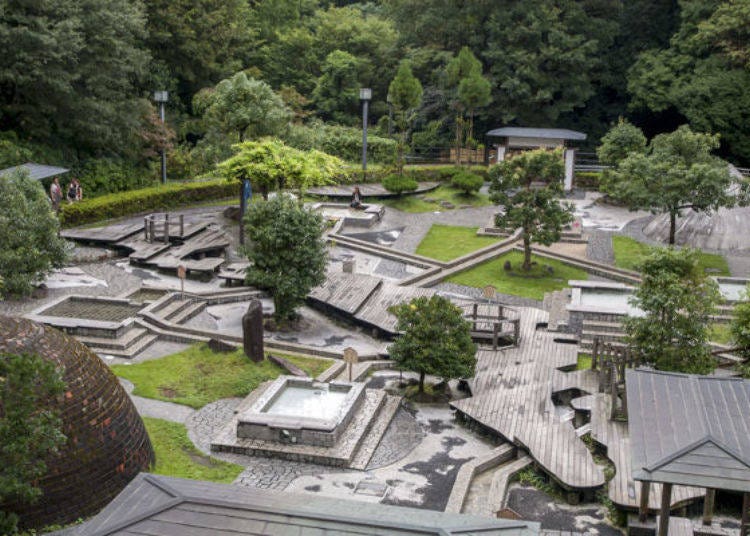
Doppo no Yu has been built after feng shui, housing a total of nine foot baths. If you look closely, you’ll notice that they are arranged in the shape if the Japanese archipelago – Hokkaido is in the upper left, while Chugoku and Shikoku are in the bottom right. The sphere and cone at the back express present and future respectively. It’s a sophisticated yet calming place.
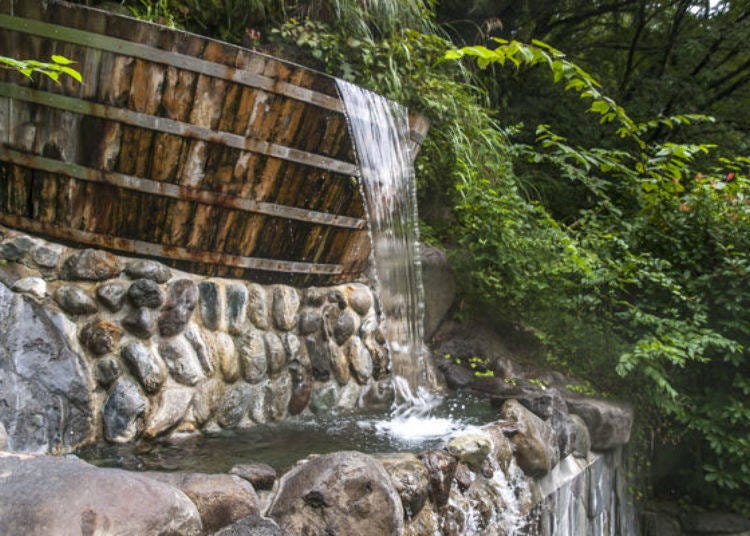
Enough about the looks of the place, let’s try out the foot baths. The admission fee is 300 yen (tax included) and you can rent a towel for an extra 150 yen, a hot spring experience that easily fits into any and all budgets.
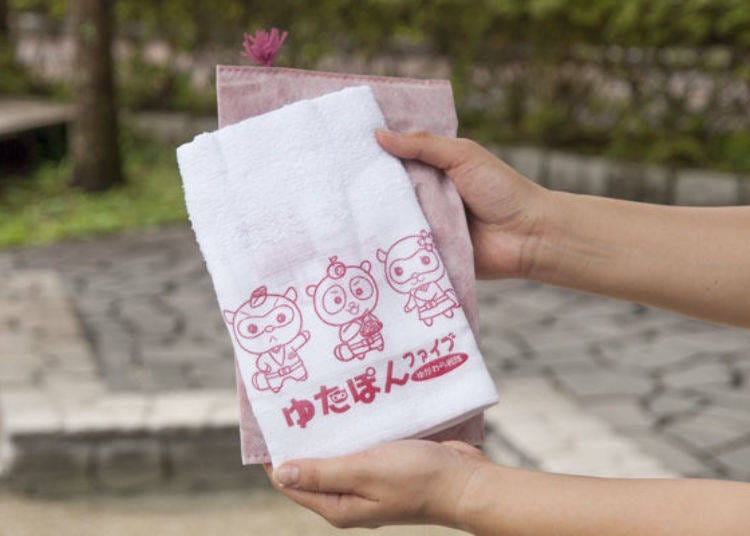
Stow away all your belonging in a locker to enjoy Doppo no Yu hands-free and to focus solely on yourself. Help yourself to a pair of sandals and let’s try the first bath! It’s called Hikotsu no Izumi, or “Calf Bone Spring.”
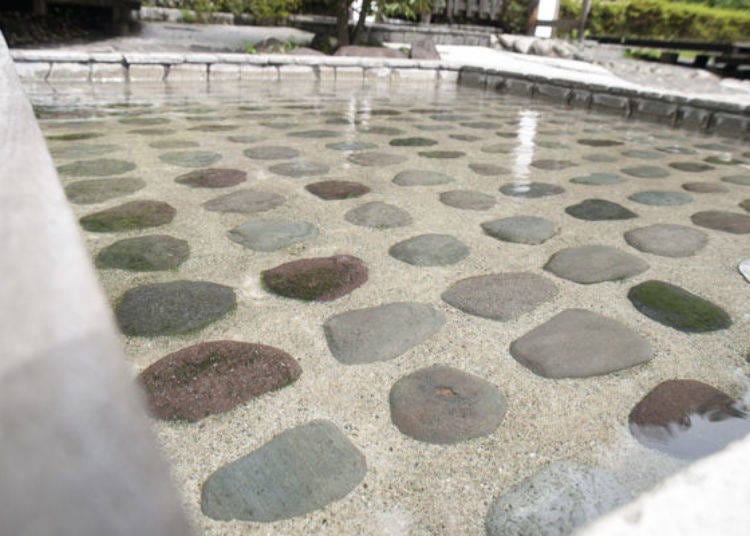
A famous feature of Doppo no Yu’s foot baths are the different floors. While the hot spring water is the same in every bath, the stones at the bottom have different shapes to stimulate the foot in different ways. While you can sit down, the real pleasure comes from walking around in the water. The Hikotsu no Izumi foot bath is created to stimulate the metabolism and while the stones look rather large, rest assured that there’s no pain but only a slow, relaxing stimulation.
The picture below shows Yorokobi no Izumi, “Spring of Joy.” It’ a jacuzzi-type foot bath that massages your feet with small bubbles rising from the floor.
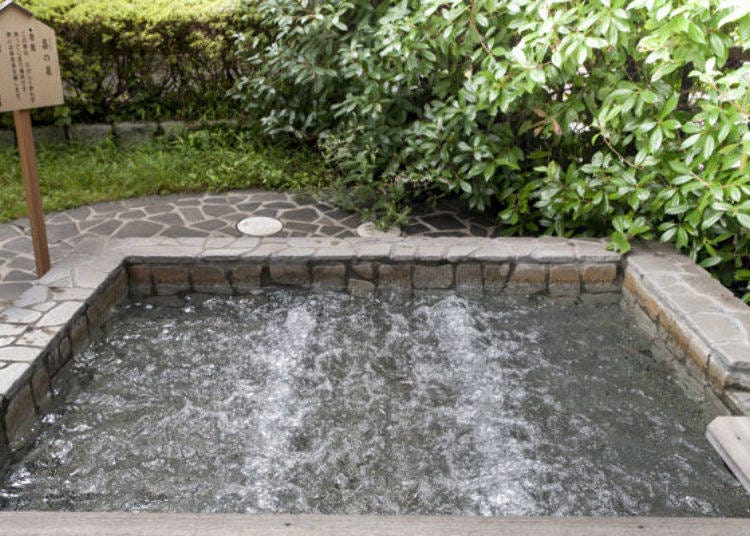
There’s also Myaku’i no Izumi that works against high blood pressure, Hikō no Izumi for skin rejuvenation, Heisei no Izumi said to have a positive effect on neuropathic pain and irritation, while Chōbi no Izumi promises positive effects on both stomach and nose. Furthermore, Shikō no Izumi is said to lift one’s spirits and calm the mind, Kanmoku no Izumi positively effects liver and eyes, while Jinji no Izumi is good for kidney and ears.
Immersing your feet in the warm water immediately has a soothing effect and a gentle feeling of relaxation spreads from your legs to your whole body. The different stones on the bottom of the foot baths are massaging, bringing pure bliss to the souls. You could stay in the warm water forever...
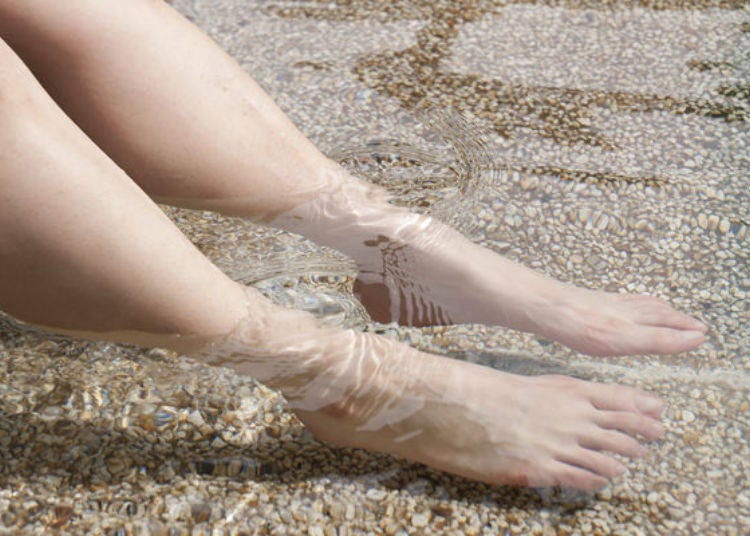
Japan’s rich foot bath culture doesn’t only attract the locals but people from all over the world. This couple came from France’s Bordeaux: “It’s very interesting and thoroughly relaxing.”
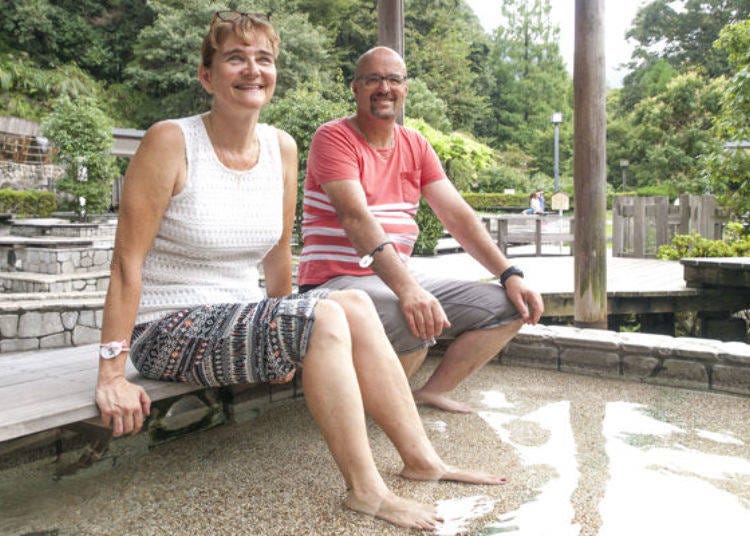
We spent about an hour at Doppo no Yu, enjoying all nine foot baths. While each of them was wonderfully relaxing, we especially loved Yorokobi no Izumi and its fine bubbles. They stimulate not just the sole but the entire foot and their gentle tickling brightens the mood in an instant. The lush nature all around Doppo no Yu adds to the experience, allowing to immerse oneself in a world of massages and pleasant feelings.
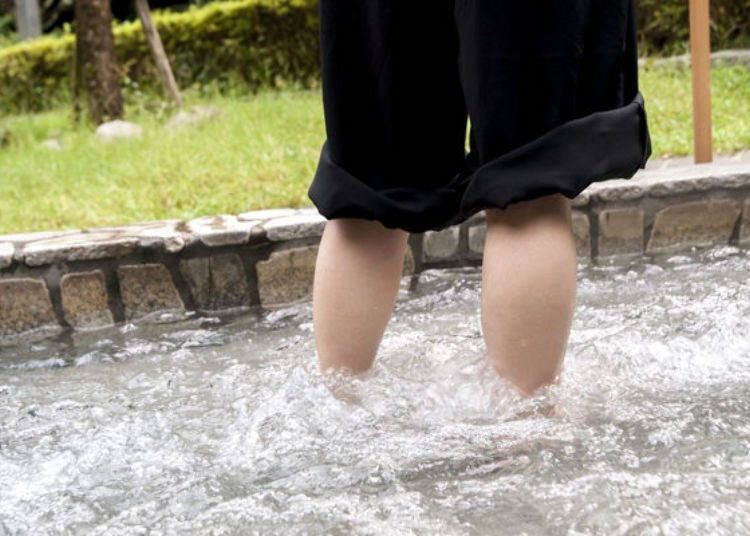
After the Bath: a Genuine Foot Massage
After enjoying the different foot baths thoroughly, why not stop by for a proper foot massage on the second floor of the resting house? A 15-minute massage can be enjoyed for the very reasonable price of 1,000 yen (tax included).
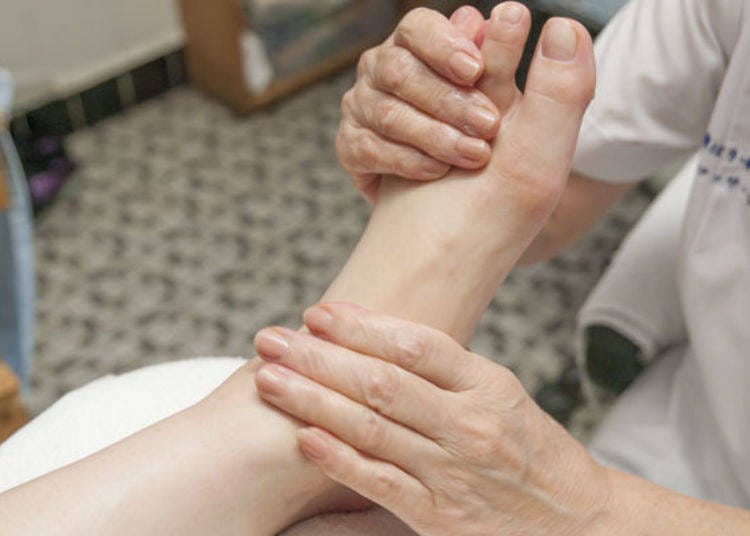
Let yourself sink into the reclining chair as your feet are massaged with horse oil. There might be some gentle pain during the procedure, but you’ll be left with a wonderfully warm feeling at your core and your entire body will feel just a bit lighter.
Last but not least, we visit a restaurant called Manyo-tei in the park for a final cup of tea. It’s a beautiful space that fits the natural park just perfectly.
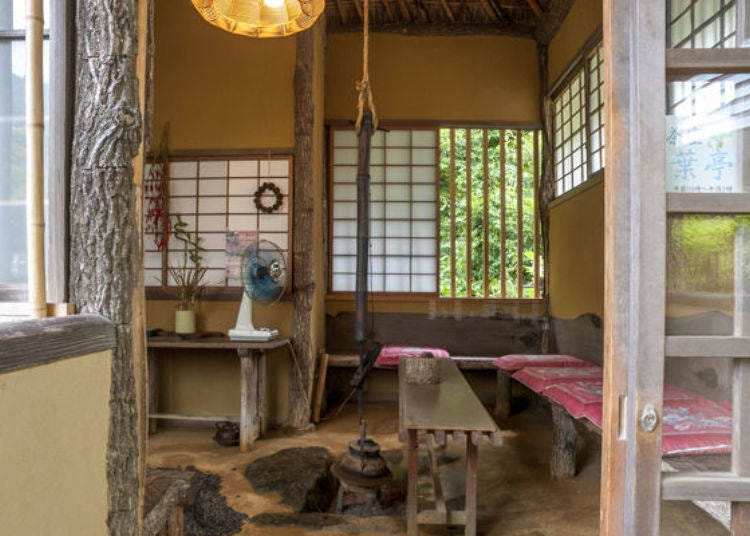
Enjoy an authentic cup of matcha tea and Japanese sweets for 400 yen (tax included) at Manyo-tei. The atmosphere of the restaurant is exceptional, with the murmuring and gurgling of the waterfall echoing in from outside – it’s like a place from another world.
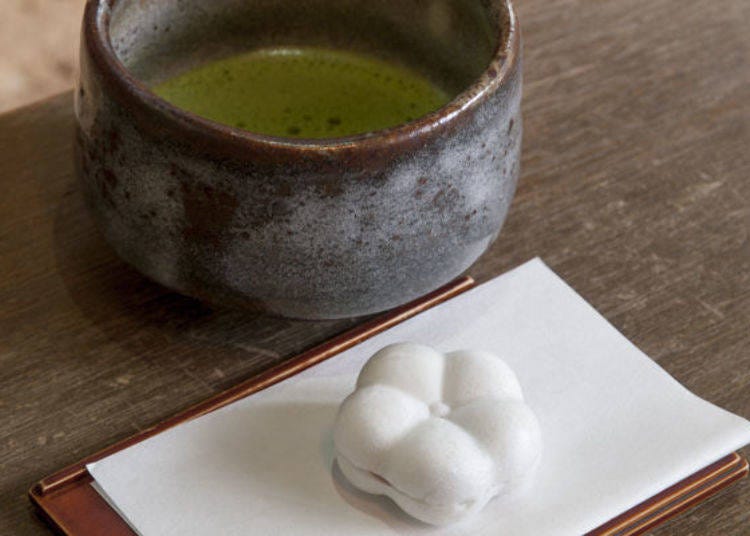
-
Manyo-tei万葉亭
- Address Inside Manyo Park, 566 Miyakami, Yugawara-machi, Ashigarashimo-gun, Kanagawa-ken 259-0314
- Phone Number 0465-64-1234
Hours: 10:00 a.m. - 3:00 p.m.
Closed: Mondays, Wednesdays (or the following day in case of a national holiday), New Year's, other irregular holidays
Foot baths are a great way to savor Japan’s hot spring culture in a more casual way while being wonderfully relaxing and rejuvenating. Nestled in rich greenery and stunningly beautiful nature, Yugawara’s Doppo no Yu is a magical spot that is sure to become a favorite memory of your trip to Japan.
-
Doppo no Yu, Manyo Park万葉公園足湯施設 独歩の湯
- Address 704 Miyakami, Yugawara-machi, Ashigarashimo-gun, Kanagawa-ken 259-0314
- Phone Number 0465-64-2326
Hours: 10:00 a.m. - 6:00 p.m. (open until 5:00 p.m. from November until February)
Admission: 300 yen for adults, 200 yen for elementary school and junior high students (tax included)
Closed: the last Thursday of the month (or the day before in case of national holiday)
Via Gurutabi
*Prices and options mentioned are subject to change.
*Unless stated otherwise, all prices include tax.
Popular Tours & Activitiess
Recommended places for you
-

To the Holy Land of Kawaii! Odakyu Tama Center Station Is Becoming a Dreamy Sanrio Wonderland
by: Guest Contributor
-
Ad

The Whisper of a 1,300-Year-Old History: Meet the Other Face of Nara at Night
by: Shingo Teraoka
-
Ad

5 Recommended Wagyu Yakiniku Restaurants in Tokyo: Signature Dishes, Premium Beef, and Secret Sauces
-

Farewell, Heavy Suitcases! Keisei Ueno’s New Service Makes Your Last Day in Tokyo Totally Hands-Free
by: Guest Contributor
-
Ad

The Latest Guide to "Tourism Mobility": Traveling Japan More Freely. What exactly are Japan’s version of ride-sharing and transit deserts?
-
Ad

Japan’s Land of Yokai Monsters and Spooky Stories! A Deep Journey to Mysterious San’in (Tottori & Shimane) for Seasoned Travelers
-
Ad

Discover Tokyo’s Best-Kept Secret: The Allure of Sento Baths
by: Yohei Kato
-

Brand New Baths! Top 4 New Bathhouses in and Around Tokyo 2024
by: Cassandra Lord
-

Autumn in Japan 2026: Fall Foliage Forecast & Where to Enjoy the Colorful Leaves (+Tour Info)
-

Tokyo Spas: Three Hidden Hot Spring Gems of Tokyo and Yokohama
-

16 Secrets About Mt. Fuji, the Symbol of Japan: Even Japanese People Don’t Know That?!
by: Guest Contributor
-

54 Tattoo-Friendly Onsen Hot Springs and Sento Baths in Tokyo
by: Korey Keen
- #best ramen tokyo
- #what to buy in ameyoko
- #what to bring to japan
- #new years in tokyo
- #best izakaya shinjuku
- #things to do tokyo
- #japanese nail trends
- #what to do in odaiba
- #onsen tattoo friendly tokyo
- #daiso
- #best sushi ginza
- #japanese convenience store snacks
- #best yakiniku shibuya
- #japanese fashion culture
- #best japanese soft drinks



















